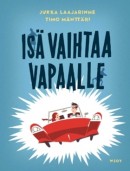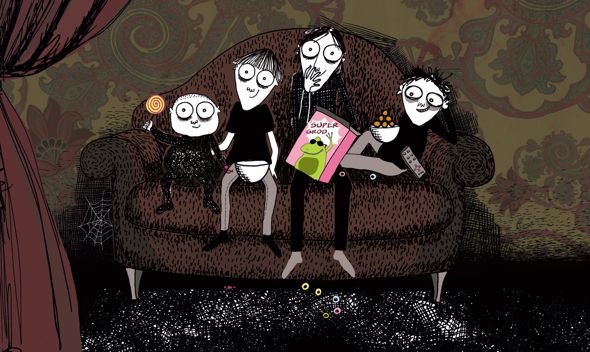Search results for "isä vaihtaa vapaalle"
Jukka Laajarinne & Timo Mänttäri: Isä vaihtaa vapaalle [Dad takes time off]
9 January 2014 | Mini reviews, Reviews
 Isä vaihtaa vapaalle
Isä vaihtaa vapaalle
[Dad takes time off]
Kuvitus [Ill. by]: Timo Mänttäri
Helsinki: WSOY, 2013. 31 pp., ill.
ISBN 978-951-0-39780-0
€26.90, hardback
Isä vaihtaa vapaalle is a picture book infused with wry humour which lends itself to both realistic and fanciful readings. In the story, a girl’s father is a secret agent. He’d like to reduce his working hours to spend more time with his daughter, but his employer has other ideas. This book provides an amusing reflection of its time: parents’ job titles often do not mean much to children, so their strange roles and the heavy briefcases parents lug home start to take on a life of their own in children’s minds. The story is free from clichés about gender roles and will entertain boys and girls alike. Timo Mänttäri, making his debut as a children’s book illustrator here, depicts fast-paced, dangerous situations and amusing details. The comic book-style narrative and large, double-page illustrations create suspense in this zippy story. The words and pictures are seamlessly integrated, and the not-overlong text is balanced by the exceptionally strong, expressive visuals.
Translated by Ruth Urbom
Reading matters? On new books for young readers
9 January 2014 | Articles, Children's books, Non-fiction

The Pixon brothers don’t read books, they love the telly: story by Malin Kivelä, illustrations by Linda Bondestam (Bröderna Pixon och TV:ns hemtrevliga sken, ‘The Pixon brothers and the homely shimmer of the telly’)
Finnish picture books for children have long been reliable export goods around the world. In the last few years, a number of novels for children have come along in their wake: works by authors such as Timo Parvela and Siri Kolu have been translated into a good many languages.
Now young adult literature has also blazed a trail on to the international market – in what also seems to be almost a matter of precision timing with regard to the Frankfurt Book Fair 2014. Finnish publishers have been investing in their home-grown lists of children’s and young adult books ever since the turn of the millennium, and now the time has come to harvest the fruits of their long-term efforts.
The Finlandia prizes: Non-fiction, Junior
28 November 2013 | In the news

Ville Kivimäki. Photo: Pertti Nisonen
The Finlandia Prize for Non-Fiction 2013, worth €30,000, was awarded on 21 November to the historian Ville Kivimäki for his book Murtuneet mielet. Taistelu suomalaissotilaiden hermoista 1939–1945 (‘Broken minds. The battle ofor the nerves of Finnish soldiers 1939–1945’, WSOY).
The other works on the shortlist of six were as follows: 940 päivää isäni muistina (‘940 days as my father’s memory’, Teos; a book on Alzheimer’s disease) by Hanna Jensen, Kokottien kultakausi: Belle Epoquen mediatähdet modernin naiseuden kuvastimina (‘The golden era of the cocottes: the media stars of Belle Epoque as mirrors of modern femininity’, Finnish Literature Society) by Harri Kalha, Viipuri 1918 (‘Vyborg 1918’, Siltala) by Teemu Keskisarja, Suomi öljyn jälkeen (‘Post-oil Finland’, Into) by Rauli Partanen, Harri Paloheimo and Heikki Waris and Vapaalasku – tieto, taito, turvallisuus (‘Freestyle – knowledge, skill, safety’, Kustannus Oy Vapaalasku) by Matti Verkasalo, Jarkko-Juhani Henttonen and Kai Arponen.
The prize-winner was chosen by the director of the Ateneum Art Museum, Maija Tanninen–Mattila. In her celebratory speech she said: ‘The symptoms of many psychologically disturbed soldiers remained untreated during the war. For many, their symptoms appeared only after the war. Their experiences have remained unexpressed in language, the history of those who lack history. Ville Kivimäki has given voice to these experiences… and succeeded in writing a book that speaks across the generations.’
In his acceptance speech Ville Kivimäki (born 1976) commented: ‘The great majority of the war generation is now dead, and the words of a youngish scholar cannot, even when successful, reach those traumatic experiences whose depth we can never fully understand. But all the same, I would like to take this opportunity to say something that should have been said years ago: the psychological injuries of the war were war wounds in exactly the same sense as physical ones. In the end anyone could suffer a psychological breakdown.’

Kreetta Onkeli. Photo: Jouni Harala
The Finlandia Junior Prize 2013 was awarded on 26 November, also worth €30,000. It went to Kreetta Onkeli for her book Poika joka menetti muistinsa (‘The boy who lost his memory’, Otava).
Arto, 12, gets such a massive fit of laughter that he loses his memory and needs to find his identity and his home in contemporary Helsinki.
The winner was chosen from the shortlist of six by Jarno Leppälä, a media personality and member of the popular stunt group Duudsonit, the Dudesons. At the award ceremony he said:
‘Poika joka menetti muistinsa is, in my opinion, a well-written story about how young people in society are put on the same starting line and expected to do equally well in all circumstances – often irrespective of the fact that their starting points may actually be very different, and completely independent of the young people themselves.’
Kreetta Onkeli (born 1970) explained in her award speech how her aim was to write a proper, old-fashioned novel for children: ‘Not hundreds of pages of magic tricks but ordinary, real contemporary life that children could identify with.’ In her opinion the current, massive trend of fantasy has narrowed the scope of children’s literature.
The following five books made it on to the shortlist: Poika (‘The boy’, Like), about a boy who feels he was born in the wrong gender by Marja Björk, Hipinäaasi, apinahiisi (onomatopoetic pun, ‘Donkeymonkey’, Tammi), about bullying and friendship, written by Ville Hytönen and illustrated by Matti Pikkujämsä, Isä vaihtaa vapaalle (‘Father on his own time’, WSOY), an illustrated story about children with too busy parents, written by Jukka Laajarinne and illustrated by Timo Mänttäri, Aapine (‘ABC’, Otava), an illustrated primer written by Heli Laaksonen in her own south-western dialect and illustrated by Elina Warsta and Vain pahaa unta (‘Just a bad dream’, WSOY) by graphic designer and writer Ville Tietäväinen and his daughter Aino, a book on a child’s nightmares.
Finlandia literary prizes are awarded by Suomen Kirjasäätiö, The Finnish Book Foundation, established in 1983.
The first Finlandia Prize for Fiction was awarded in 1984. This year it will be announced on 3 December.

